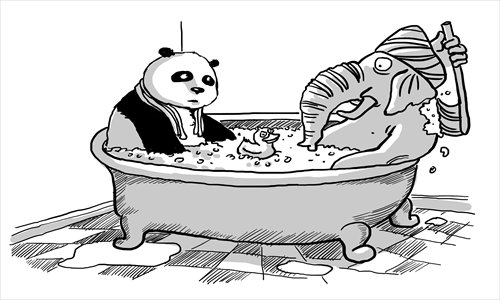India, China can rule waves together

China and India are both emerging powers. With their growing integration into the global economy, they have highlighted the importance of maritime security, because it can affect their national development and economic stability.
After the Cold War, naval power of China and India has increased significantly and the scope of their activities has been expanded seaward.
China has dispatched its warships to the Gulf of Aden for anti-piracy missions since December 2008. It has also strengthened its friendly relationship with countries in the Indian Ocean through economic assistance and infrastructure projects.
With its growing economic and military capabilities, India has been devoting itself to be a major player in the Pacific since the 1990s through its Look East Policy. It has boosted its political, economic and military relationships with Asia-Pacific countries and claims that India's maritime "area of interest ... extends from the North of the Arabian Sea to the South China Sea," said then Indian defense minister George Fernandes in 2000. The Indian Navy has begun to enter the South China Sea frequently to conduct joint exercises with coastal states in this area.
China and India are both major powers in the region and their relationship can shape the security environment in the whole Indo-Pacific region. Both sides will continue to pay increasing attention to each other in the maritime realm and have more interactions at sea in the future.
Based on their strategies, some scholars predict that China and India are destined to be rivals. India has been consistently strengthening its naval forces in the Indian Ocean, viewing it as "India's pond." However, China also has interests in this region and it believes the Indian Ocean should be open to every country. There are mutual suspicions and uncertainties between the two.
Naval cooperation between India and countries such as the US, Japan, Australia, South Korea and ASEAN nations puts China on alert because India's involvement will make the regional security situation more complicated. From India's perspective, China is carrying out a so-called "String of Pearls Strategy" to "encircle India." Many Indian and Western analysts believe that China is seeking to set up bases and establish access to dual-use docking facilities in Indian Ocean ports.
It is natural that China and India, as two regional emerging powers, will possess similar and even overlapping maritime interests. However, does it mean that China and India are destined to be rivals? How should the two countries reconcile competing maritime interests? These questions are very important for both sides. As global political forces are undergoing realignment, the future of the Sino-India relationship will affect the entire international pattern.
There are contradictions in China and India's maritime strategies. However, these can be solved by peaceful communications. China and India also have many common interests, such as the security of international shipping lanes, humanitarian assistance, disaster relief, marine search and rescue, peacekeeping, and oceanic environmental protection. There is enough space for China and India to develop alongside each other.
The author is a scholar at the College of Politics and Public Administration at Tianjin Normal University. opinion@globaltimes.com.cn